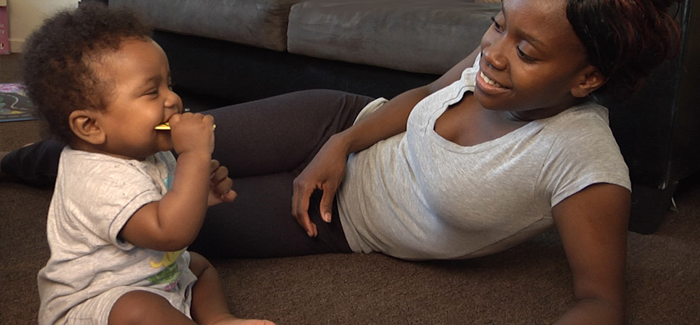
Don’t just do it, talk them through it, is a Thirty Million Words mantra. (Photography by Beth Suskind)
Dana Suskind leads an initiative to improve parental communication, a key factor in a child’s success.
As early as age 3, kids born into poverty face a major disadvantage simply because those in more affluent homes have heard more words—on average, 30 million more—in their young lives. Dana Suskind could not tolerate this obstacle to the long-term potential of poor children. “We have this lack of school readiness, these kids who don’t even have a chance,” she says. “These kids we can look at right now, at the age of 2 ... and already know what their life course is.”
To help change that course, Suskind, a pediatric cochlear-implant surgeon, founded the University of Chicago Medicine’s Thirty Million Words Initiative in 2009 with the goal of teaching parents and other early-childhood caregivers how to nurture brain development through frequent, high-quality communication.
The Thirty Million Words Initiative tracks language development and provides feedback to families on their progress. It encourages parents to talk with their kids rather than to them. “The goal is to add more language and interactions to things they’re already doing, rather than adding more things to their already busy lives,” says Beth Suskind, Dana’s sister-in-law and the project’s codirector and director of innovation and social marketing.
Using the mantra don’t just do it, talk them through it, Thirty Million Words offers strategies to incorporate conversation into routine activities. While dressing, feeding, or bathing children, parents are instructed to discuss the activities—which arm goes first while putting on a shirt, for example, or why hot weather makes shorts a good choice.
In a randomized control trial with 40 families, the experimental group received eight weeks of lessons on topics including book sharing, numbers, and strategies for integrating more words into daily life. They wore a special recording device that tracked their interactions and words exchanged. At weekly home visits, Thirty Million Words team members reviewed families’ word totals to gauge progress and set new goals. During the intervention, in addition to speaking more with their kids, parents in the experimental group significantly increased back-and-forth conversation.
A mother from one family said, “‘I made a lot of connections in my baby’s brain today,’” Beth Suskind remembers. “This was the way she had internalized it. I get goose bumps when I think of that one.”
Dana Suskind’s colleagues describe her as a “dynamo,” “a force,” and “a tiny little person” with an infectious drive and a constant flow of ideas. “She never stops,” Beth Suskind says. “She actually runs to the restroom because she doesn’t want to miss the work time.”
Lately she’s been running everywhere. Suskind was invited in September to join the advisory council for Too Small to Fail, a Clinton Foundation and Next Generation initiative that promotes learning, health, and well-being for kids up to age 5. In October she participated in a White House event focused on closing the early language gap, and days later she presented, along with other speakers including secretary of education Arne Duncan, U-High’82, at NBC’s Education Nation Summit. “There’s been this tremendous amount of momentum that, I swear, I think my husband is orchestrating this from above, because there’s no way that everything is happening at one time,” Suskind says.
In August 2012 her husband, Donald Liu, who was section chief of pediatric surgery at University of Chicago Medicine’s Comer Children’s Hospital, drowned in Lake Michigan while attempting to aid two boys struggling in rough waters.
Suskind and Liu came to the University of Chicago in 2001. She helped start the pediatric cochlear implant program at the University of Chicago Medicine five years later. The implants enable deaf and severely hearing-impaired children to hear electronically by capturing sound, translating it into digital signals and then electrical energy, and transmitting it to the auditory nerve. Through this work Suskind began noticing that her patients of lower socioeconomic status were experiencing less success with reading and speaking postimplant than those of higher status. Questioning why this disparity existed, she turned to social science experts, who directed her to a 1995 study by researchers Betty Hart and Todd Risley. The study found that poorer kids heard 30 million fewer words than wealthier kids by the time they reached age 3, leaving them less prepared for school and compromising their long-term potential.
Moved by Hart and Risley’s study, Suskind created Project ASPIRE, an educational program for parents of children with hearing loss. Then she expanded the scope in an effort to teach all families the critical role talk plays in determining kids’ future success.
Suskind and her team are now planning a long-term study tracking kids’ language development from birth until well into their school years. They recently received a grant from the Milgrom Foundation at the University to incorporate into the Universal Newborn Hearing Screen lessons for parents about the importance of language from the moment their baby is born. And they want to roll out Thirty Million Words Chicago, which would move beyond family homes to pediatricians’ offices, day care centers, schools, churches, and libraries.
Suskind’s ideas drive and fuel the growth, but she’s quick to point out the array of expertise necessary to tackle such a complex issue. “I have incredible collaborators who I work with and an incredible team,” Suskind says. “I always say, God forbid it’s a surgeon who’s doing all of this. We’d only use a scalpel.”
